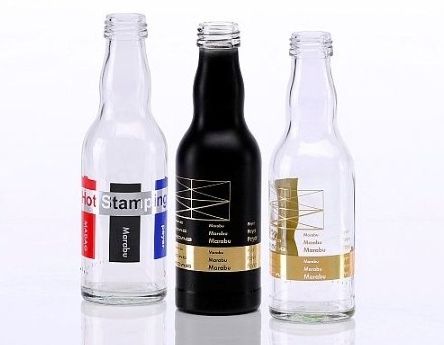 s Glasstec in Düsseldorf (in hall 12, stand A35), Marabu will be presenting glossy metallic effects created by hot stamping in conjunction with Ultraglass UVGL primers. This combination is an attractive alternative to inorganic ceramic inks, offering equally brilliant results for a significantly lower price. Marabu will also showcase their highly adhesive solvent-based Maraglass MGL and Tampaglass TPGL screen printing and pad printing inks, and the new Marashield UV-CGL shades for printing large glass surfaces.
s Glasstec in Düsseldorf (in hall 12, stand A35), Marabu will be presenting glossy metallic effects created by hot stamping in conjunction with Ultraglass UVGL primers. This combination is an attractive alternative to inorganic ceramic inks, offering equally brilliant results for a significantly lower price. Marabu will also showcase their highly adhesive solvent-based Maraglass MGL and Tampaglass TPGL screen printing and pad printing inks, and the new Marashield UV-CGL shades for printing large glass surfaces. Glossy gold and silver effects – hot stamping with UV inks
To achieve high-gloss gold and silver effects, the glass industry generally employs ceramic inks. These are expensive to purchase, and the firing process is energy-intensive and therefore costly. Organic UV inks are cheaper, but do not produce the same glossy effects. In Düsseldorf, Marabu will present an attractive alternative: hot stamping with UV inks. The required image or text is screen-printed onto the glass surface with Ultraglass UVGL primer, serving as a type of cliche for the hot foil. The foil is transferred onto the pre-printed ink film, either through roll-on stamping or vertical stamping – the foil only adheres to the areas that were primed with UVGL. The result is a high-gloss gold and silver finish at a much lower price.
Solvent-based screen printing and pad printing inks for glass
The glass industry is trending toward UV inks, but solvent-based inks are often an appealing option, especially for graphics requiring only a single colour. And no additional UV equipment is needed. At Glasstec, Marabu will present its Maraglass MGL solvent-based screen printing ink and the new Tampaglass TPGL pad printing ink. MGL is ideal for high-gloss results on flat glass. Durable TPGL ink is suitable for a variety of tasks, and performs especially well on rounded objects such as small glass jars for cosmetics. Both MGL ink for screen printing and TPGL ink for pad printing adhere well to a wide variety of substrates, and ensure brilliant precise colours. These inks were developed in line with the latest standards, and according to strict EU directives and hazardous materials requirements.
Screen printing inks for touch user interfaces, 3C devices and automotive industry applications
On many devices, membrane switches are increasingly being replaced by glass touch panels. The combination of electronics with state-of-the-art glass products results in durable surfaces that are easy to keep clean – making them suitable for medical equipment and building-control systems, for example. UV-curable, solvent-based inks such as Marabu’s Ultraglass UVGL and Maraglass MGL are ideal for printing on touch panels. These highly adhesive screen printing inks feature high resistance to alcohol, extreme temperatures and chemicals.
High-opacity inks such as MG3C and UVG3C are used on 3C (3C = computing, communication and consumer electronics) devices, such as smart phones and tablets.
Organic inks are playing an increasingly important role in the automotive industry. A notable use for screen printing is for applying PVB interlayers onto laminated safety glass.
Digital printing on glass – liquid coatings and UV inkjet inks for interior design
Digital printing on glass will be another hot topic in Düsseldorf. Marabu will spotlight their Marashield product range, comprising UV-curable and water-based liquid laminates. Marashield liquid coatings can be used as primers, for finishing, as a protective coating for high-quality digital prints, or, in the new UV CGL shades, for colouring large glass surfaces. The latter is especially suitable for interior decorating purposes. Kitchen and furniture manufacturers can choose from a wide variety of shades, and are able to offer their customers specific colours from the Pantone, RAL, HKS, etc. systems. Glasstec visitors can experience live demonstrations using UV CGL inks at the Robert Bürkle stand (hall 12, B65). Marabu will also showcase their line of UV-curable UltraJet injket inks, ideal for custom-printed glass backsplashes, photorealistic printed window surfaces, high-quality images and signs, and glass worktops. Evenly-applied Marashield UV PGL primer acts as a bonding layer. As a result, UV flat-bed printers can be employed for a far greater range of applications than ever before.





